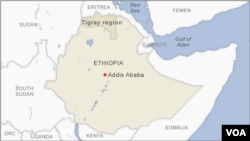Ethiopian government forces and their allies have captured the city of Shire and two more towns in the Tigray region in an offensive that aims to take control of airports and federal infrastructure.
The attack has been met with international calls for an immediate ceasefire and for neighboring Eritrea to withdraw troops from the region. The fighting has also dashed hopes for African Union-led peace talks.
In a statement, the Ethiopian government said its forces have taken control of Alamata, Korem and Shire city in the Tigray region and will coordinate with aid groups to get aid into those areas.
The rebel Tigray People’s Liberation Front acknowledged losing ground to the government troops but said it will defend itself against the enemies.
“Shire is the second-largest city in Tigray and strategic as it's at a crossroads, potentially making it easier to advance towards Axum and Adwa” said William Davison, the International Crisis Group’s senior analyst for Ethiopia. “It also has a major road south leading from it. So it's a strategic and psychological boost (for the Eritrean and Ethiopian federal forces). But of course, we are yet to see how quickly this advance will continue. It's possible there will be a rapid move towards Makelle or there could be resistance along the way that prevents that.”
On Monday, the Ethiopian government said it was seeking to take control of critical infrastructure in the region, including airports and communications facilities.
The war in Tigray is nearing the two-year mark, with no sign of peace in sight. In August, the conflict resumed after five months of truce.
Davison said planned peace talks between the TPLF and the government may be for naught if the government asserts authority in Tigray.
“It’s not clear who they will be negotiating with if they succeed. So, it looks more like 2020 rather than 2022, meaning that in 2022, there’s been a focus on a negotiated settlement before the resumption of the conflict. But if they are trying to take control of Tigray it's not clear who they will be negotiating with at the end of it.”
This month's planned peace talks in South Africa and other peace processes failed to launch, as the sides continue to disagree on the venue and mediators of the reconciliation efforts.
The head of the Horn Institute for Strategic Studies, Hassan Khannenje, said all means possible need to be used to bring the factions to the negotiating table.
“It’s important that the parties also present mediators who are at least going to appear neutral or impartial to both parties" said Khannenie. "Part of the challenge in recent months has been the perception some mediators may not exactly be neutral. It’s going to be important that the framework of the mediation also involves a degree of carrots and sticks to ensure that spoilers are not going to have their way because, without the ability to enforce the agreement, of course, it’s going to be violated.”
Khannenje adds that without some incentives for the parties just to come to the table, both sides may be reluctant to negotiate at all.




